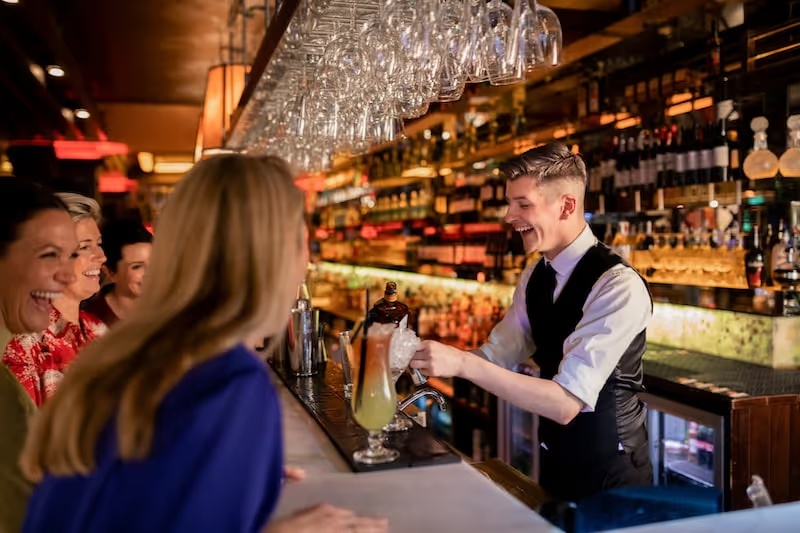Ready to modernize your Restaurant?
Talk to a restaurant expert today and learn how MarketMan can help your business
If you have any questions or need help, feel free to reach out
Request a demoDon't miss out on maximizing your restaurant's profits! Calculate your ROI with MarketMan
Calculate ROIOpening a bar can be an exciting venture, but it requires careful planning and preparation. From choosing the right location to obtaining the necessary licenses and permits, there are several key steps to consider.
In this ultimate guide, we will explore these important aspects of opening a bar and provide key takeaways to help you succeed in this industry.
Whether you're embarking on launching your first restaurant, opening a second (or third) location, or ready to turn your restaurant business into a franchise, this guide will help you make the smartest decisions possible for your business
Download E-bookYou can't sell alcoholic beverages at your bar without a liquor license. Before applying for a liquor license, research the specific requirements and regulations for obtaining a license in your area. This may include meeting certain age and residency requirements and providing documentation such as background checks and financial statements.
Once you've gathered all the necessary information, you can fill out an application form and submit it to the appropriate government agency. Before submitting, carefully review the application and ensure you've included all required documents and fees.
Once you've submitted your application, you'll enter a waiting period for processing. During this time, the government agency will review your application and conduct any necessary inspections.
If your application is approved, you'll receive your liquor license. This license will come with certain responsibilities and restrictions, such as specific hours of operation and rules regarding the sale and consumption of alcohol. Familiarize yourself with these regulations and ensure that your bar operates in compliance with the law.
Once you have a clear understanding of the legal requirements and have successfully applied for your liquor license, the next step is to obtain the necessary business permits. These permits are essential for operating a bar and ensuring compliance with local regulations.
Common permits include:
Tip: Consult with a legal professional or business advisor who specializes in the hospitality industry to help you navigate the application process smoothly.
Safeguarding your bar's identity is crucial in a competitive market. Registering your name and logo with the USPTO is a key step in protecting your brand. Here's a quick guide to ensure your trademarks are secure:

The quest for the ideal bar location is pivotal to your success. It's not just about finding a space; it's about finding the right space. Here's what to consider:
The location of your bar is a major investment and will significantly influence your startup costs. Choose wisely to maximize visibility and accessibility, ensuring a steady stream of patrons.
The layout and decor of your bar are pivotal in setting the right mood and atmosphere. A cohesive theme is key to creating an inviting space. Here are some steps to guide you:
Remember, the goal is to provide an unforgettable experience that encourages repeat business, an increase in sales, and an improved profit margin. Use social media and your website to increase foot traffic by showcasing your unique space and generating excitement before the grand opening.
Equip your bar with the right tools and supplies for smooth operationand customer satisfaction.
Some essential bar equipment includes:
Don't forget the small wares: straws, napkins, and cleaning supplies are just as important as the larger investments. Regular bar inventory checks ensure you're well-stocked and ready for busy nights.
Investing in a robust inventory management system can streamline this process, integrating with your POS system for real-time tracking. This not only helps with stock control but also with identifying trends and preventing loss.

Although a creative menu will set you apart from the competition, a profitable menu will set you up for long-term success. Aim to create menu items with low food cost percentages and high gross profit margins to boost profitability.
Consider the cost of ingredients, desired profit margins, and competitive pricing when building your menu. Implementing a digital cookbook can help you create profitable, perfectly portioned menu items, minimize waste, and maintain menu profitability as you launch and grow your bar business.
3 Essential menu pricing strategies include:
Your bar's success hinges on the team behind the bar from the manager to the bar back. A well-trained and cohesive team elevates the customer experience, builds your bar's reputation, and keeps your business running like a well-oiled machine.
Optimize your bar's workflow with efficient bartender stations, organized inventory, and a streamlined ordering process for maximum efficiency.
Equip each bartender station with all the necessary tools and ingredients, making it easy for bartenders to prepare drinks quickly and ensure smooth operations. Keep track of stock levels regularly to prevent over-ordering and guarantee popular items are available. Integrate restaurant management software with a point-of-sale system to simplify order-taking and reduce errors.

MarketMan is a cloud-based restaurant inventory management software that takes the guesswork out of running a bar and simplifies all back-of-house operations. From recipe costing and COGS management to inventory item forecasting and robust reporting, MarketMan empowers bar managers and operators to do more with a bird's eye perspective of their business. With the ability to integrate with other restaurant technology like POS systems, labor tools, and accounting software, MarketMan users can build a tech stack built for their specific needs to drive results and profitability. Book a demo and learn how MarketMan can help you optimize your bar operations today!
Talk to a restaurant expert today and learn how MarketMan can help your business